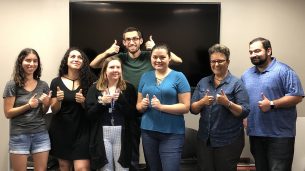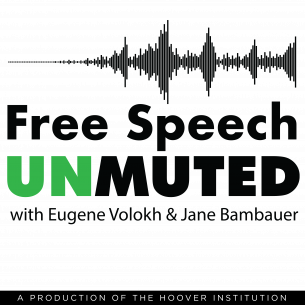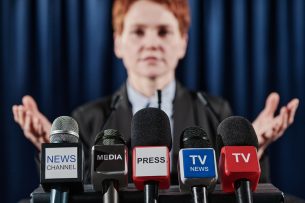
For years, researchers have grappled with understanding the relationship between technology and political behavior. A team of researchers has developed a novel approach to examine how AI-related news consumption, discussions and literacy influence citizens’ support for AI policies.
Read more
Deputy Director of Newsroom AI and Automation Ryan Serpico is part of Hearst's DevHub – a centralized team that helps five Hearst newsrooms (and supports others) create their own data-driven reports, interactives, templating systems and more.
Read more
A new study has found that perceived AI ethics can play a vital role in mediating between self-efficacy and technological factors and lead to a more positive attitude toward AI technologies. The findings by Seungahn Nah, Dianne Snedaker Chair in Media Trust and research director for the Consortium on Trust…
Read more
A new study has found that virtual reality-induced awe, either supernatural or natural, can motivate people to improve themselves. The findings by Yu-Hao Lee, University of Florida College of Journalism and Communications Media Production, Management, and Technology associate professor, and Taiwan National Chengchi University scholars Jih-Hsuan Tammy Lin, Ji-Wei Yang…
Read more
Social media influencers have become economic and social capital powerhouses. But now virtual influencers, computer-generated characters, who, despite not actually being alive, are also engaging with audiences using persona-focused personal brands. But how effective are they?
Read more
Jane Bambauer, Brechner Eminent Scholar and the director of the Marion B. Brechner First Amendment Project at the University of Florida College of Journalism and Communications, is the cohost of “Free Speech Unmuted” with Hoover Institution fellow Eugene Volokh, one of the foremost U.S. experts on the First Amendment and…
Read more
A new study has found that tailored messages communicated by online agents, both humans and chatbots, are more effective for achieving a positive response. The findings by University of Florida College of Journalism and Communications (UFCJC) alumna Sophia Mueller, Ph.D. 2023, former UFCJC dean of Graduate Studies and Research and…
Read more
A new study has found that although artificial intelligence (AI) news differs from human news, machine-generated news is not necessarily more biased compared to human news regarding gender and race/ethnicity. The findings by Seungahn Nah, Dianne Snedaker Chair in Media Trust and research director for the Consortium on Trust in…
Read more
As the 2024 election season ramps up, voters are looking for reliable information about candidates to help them decide who to support on election day. Unfortunately, that reliability is threatened by a wave of disinformation that is bolstered by increasingly sophisticated artificial intelligence tools. “In 2024, we should be most…
Read more
A new study has found that virtual influencers are perceived as less authentic across all product types. The findings by University of Florida College of Journalism and Communications (UFCJC) doctoral student Fanjue Liu and UFCJC Media Production, Management and Technology Associate Professor Yu-Hao Lee are featured in “Virtually Authentic: Examining…
Read more
Seungahn Nah, Dianne Snedaker Chair in Media Trust and research director for the Consortium on Trust in Media and Technology at the University of Florida College of Journalism and Communications (UFCJC), and UCLA Communication Associate Professor Jungseock Joo are the co-editors of “Rethinking Artificial Intelligence (AI): Algorithmic Bias and Ethical…
Read more
A new study has revealed the innate ability of virtual humans within video content to persuade humans to engage in stopping misinformation and seeking scientific information about climate change. The findings by Won Ki-Moon, University of Florida College of Journalism and Communications Advertising assistant professor, University of Texas at Austin…
Read more